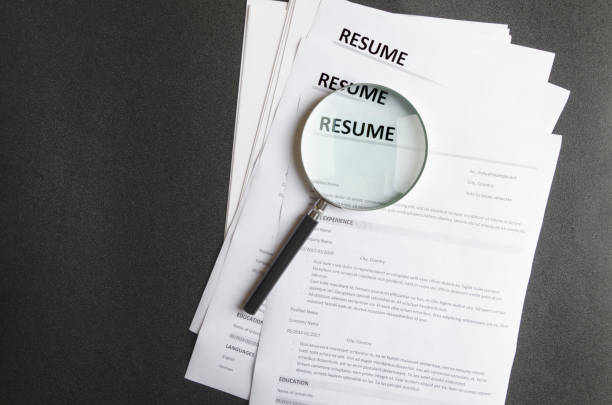Unprofessional resumes contain spelling errors, grammatical errors, and other problems that may cause employers to reject an applicant.
How to Avoid Writing Unprofessional Resume, resume writing Tips at fulltimejobs.com
When you are looking for a job, your resume is an important factor for potential employers to determine your fit for the job. It is beneficial to understand some of the common mistakes and challenges in writing a resume in order to craft a convincing document that will impress hiring managers. The following article discusses 15 of the most common resume mistakes and how to avoid them.
How do you make a resume?
A resume generally summaries your professional profile, work history, education, and any volunteering and internship experience you have.
As you write your resume, you may wish to keep with this format and include skills related to the job you are applying for. The professional and educational backgrounds sections of your resume typically contain lists of achievements. Please include a professional email address along with your current contact information.

Common resume mistakes and how to avoid them
These are some of the most common resume mistakes you can avoid by following a template, checking for grammatical errors, and sticking to details that are relevant to the job you are applying for:
1. Use an objective rather than a professional profile on your resume
You should include a brief description of your professional background. In the case of limited work experience, relate your career objectives to how achieving your goal can benefit the company you are interested in working for.
Even though resume objectives can show how you set your career goals, employers are more interested in what you can do for them and how you will fit in with the organisation. This is what your professional profile shows. Your resume or career objective only highlights your aspirations. Include your career objective if you must, but make sure it relates to the business and how you will achieve your goals.
2. Irrelevant work experience
You should list work experience and skills that are both quantitative and relevant to the position you are applying for on your resume. Employers should be able to see in your work history what skills and achievements you are bringing to their organisation. Instead of listing all of your responsibilities, listing only the skills and accomplishments that are relevant to the position might be a better idea if your past roles seem unrelated.
Instead of listing specifics about running a register, you might highlight how you interacted with and helped customers if you are applying for a customer service position, but your experience is limited to working as a cashier.
3. Insufficient details
Professional experience on a resume typically consists of three to five details detailing how you succeeded in your previous role. A potential employer may be tempted to skip over your resume if it offers less detail than this as vague details may not be sufficient to explain why you are a good fit for their organisation. You can make sure you are providing adequate information about your abilities by using action verbs that demonstrate what you have accomplished.
4. Insufficient or excessive references
You could get turned down for an interview if you fail to include your professional references, but too many references could also impact how an employer views your resume. Most employers will ask for two to three references, on average. Make sure that your references are professionals with whom you have interacted in a professional setting as well as a sufficient number.
Past colleagues, supervisors, or clients who can provide positive feedback about your work ethic or other information should your potential employer contact them can be included. Be careful not to use family members or close friends as references. In the same way, if you leave out a reference section, avoid stating that you will provide it upon request. Such a statement may appear redundant to a potential employer.
5. Lack of relevant skills for the position
In the same way that listing irrelevant work experience can cause a hiring manager to overlook your application, listing skills that are irrelevant to the job can cause the manager to ignore your application. If you include skills that can directly apply to the role, you will be able to avoid this mishap. If you have computer skills that can be applied to a data entry job, you might highlight that on your resume. On the other hand, if you have customer service skills but are applying for a position as a production worker where customer contact is not necessary, you might want to omit those skills.
6. Apply for all jobs with the same resume
It is important to format your resume so that it is relevant to the job that you are applying for. Employing the same resume for every job application you make may appear lazy or unconcerned about the position. Your resume should be tailored to each job description in order to avoid this mistake. The process of writing a targeted resume can be more time-consuming, but it will give potential employers an insight into how well you will fit the job.

7. Inaccurate or missing contact information
Make sure your contact information is up to date. Anyone should be able to reach you via phone, and your address should be your current residence. If you revisit a previous resume after some time, make sure you update your contact information to reflect any changes you have since made like moving or switching cell phone carriers.
8. Highlighting job duties instead of professional accomplishments
You may share duties with a colleague in a related field, but your accomplishments demonstrate your dedication to what you do as well as how you will benefit your company. Although you might include a specific and relevant duty or task you were responsible for, you should also connect those details to an accomplishment that illustrates how your work performance directly impacted and benefited your previous employers.
9. You have an excessively long or short resume
Generally, resumes are no longer than one or two pages at most, so either too short or too long can negatively impact how a potential employer perceives you. It can be effective to use one page for your resume if you have limited work experience or an extensive work history. If you are a fresh graduate or have limited work experience, it might be more advantageous to use two pages rather than more.
10. Punctuation and formatting errors
If your resume contains spelling, grammar or punctuation errors, you should scan and correct them before submitting. You may also wish to make sure you have formatted your resume properly with clean lines and an easy-to-read font, as well as not making it too complicated. In addition, you may want to avoid bright colours that take the attention away from the content of your resume. Make sure to use black ink and a basic font like Times New Roman or Arial. Check your resume for proper grammar using a grammar checker.
11. Email addresses that are unprofessional
You could use your first and last name in your email address, or something similar. If it contains profane or provocative language, an unprofessional email address can be highly inappropriate. Creating a professional email address only for correspondence related to your job applications is a good idea if you have not already done so. You will appear professional and formal when you include your professional email address on your resume.
12. Requirements for salary
While you might be looking for a certain minimum salary, including this information in your resume might not work. A company may be turned off by this, particularly if they cannot offer the salary you are seeking. The best way to avoid this mistake is to leave it off your resume completely. It is common to discuss salary during an interview or within a cover letter, so it can be a good idea to omit a salary requirement on your resume.
13. Use of excessive vocabulary or jargon
Using jargon or vocabulary that is repetitive can potentially detract from the message you are trying to convey just as providing an endless list of job experiences and skills can become redundant and risk losing an employer's attention. Avoid cliche phrases and outdated vocabulary that may detract from how you can fit the job you are applying for. Be specific with your writing and use actionable words that show employers what you mean.
14. Mentioning hobbies unrelated to your job
It might be appropriate to include a section highlighting your hobbies if they relate to the job role, such as participating in weekly fundraiser events for a nonprofit organization. In contrast, if your hobbies include playing golf on weekends, you might think twice about listing hobbies on your resume. If you list your hobby as collecting stamps, a hiring manager could completely disregard your application. Generally, employers tend to look past hobbies in any case. Your personal interests should not be included unless they are directly related to your career path.
15. Uploading a photo of yourself
Although some industries may accept you including a photo on your resume, such as acting and modelling, you may not want your photo to be prominently displayed. In addition to taking up space, a photo risks employers passing over your application so as not to be distracted by appearances. Frequently, employers skip resumes with photos in order not to risk being perceived as discriminatory.
Although these mistakes may be easily corrected, you might want to ask a friend or relative to review your resume to ensure you have not made any mistakes. If you follow these steps, then you can be sure you are sending a resume that is as professional as possible.